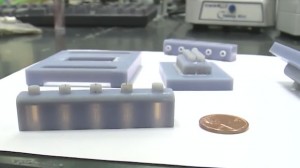NEW YORK (Reuters Health) – Contrary to expectations, dietary supplementation with omega-3 (n-3) fatty acids and antioxidants does not improve outcomes in patients with acute lung injury. In fact, it may be harmful, according to a report published online October 5th by the Journal of the American Medical Association.
“Despite significant increases in plasma n-3 levels, we did not demonstrate a reduction in levels of inflammatory biomarkers,” comment Dr. Todd W. Rice, with Vanderbilt Medical Center in Nashville, Tennessee and colleagues.
They explain that patients at risk of developing acute lung injury resulting from pneumonia or sepsis, for example, have reduced plasma levels of n-3, suggesting that supplementation might be helpful. Three randomized trials of an enteral formula of n-3 fatty acids, alpha-linolenic acid (GLA), and antioxidants in this setting indicated that it improved lung physiology and clinical outcomes, but sample sizes were too small for definitive conclusions.
The team therefore conducted a randomized trial of twice-daily enteral supplementation of n-3 fatty acids, GLA, and antioxidants compared with an isocaloric control formulation, starting within 48 hours of the development of acute lung injury requiring mechanical ventilation in adult patients. The primary endpoint was the number of ventilator-free days over the first 28 study days.
“The study was stopped by the DSMB (data and safety monitoring board) for futility at the first interim analysis after 143 patients had been randomized to receive the n-3 supplement and 129 to receive the isocaloric control,” the researchers report.
Despite an eightfold increase in plasma eicosapentaenoic acid levels, patients in the supplement group had fewer ventilator-free days (14.0) than the control group (17.2; p=0.02), and fewer ICU-free days (14.0 vs 16.7; p=0.04), they found.
Furthermore, adjusted 60-day mortality rates were 25.1% in the n-3 group compared to 17.6% in the control group, although the difference was not statistically significant (p=0.11), Dr. Rice and colleagues report.
They discuss various possible reasons for the observed difference between this trial and earlier studies: the use of bolus supplementation rather than continuous enteral infusion, differences in the composition of the control supplement, and variations in the use of controlled ventilation and fluids.
Still, they conclude, “This study suggests that twice-daily enteral supplementation of n-3 fatty acids, GLA, and antioxidants change plasma levels of n-3 fatty acids but do not improve clinical outcomes or biomarkers of systemic inflammation in patients with ALI (acute lung injury) and in fact may be harmful.”
Reference:
Enteral Omega-3 Fatty Acid, ?-Linolenic Acid, and Antioxidant Supplementation in Acute Lung Injury
JAMA 2011;306.




